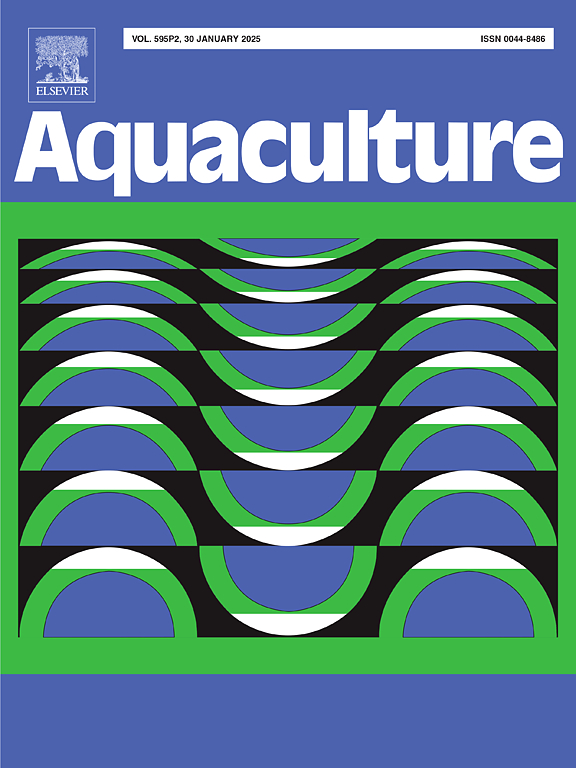两种同属牡蛎CSAD调控牛磺酸合成和热适应的功能特征及其基因组变异
IF 3.9
1区 农林科学
Q1 FISHERIES
引用次数: 0
摘要
牡蛎的特点是牛磺酸含量极高,这是这些贝类具有营养和商业价值的关键原因之一。然而,在这些生物中,关键代谢基因的功能及其调控机制仍然知之甚少。在本研究中,我们证实了半胱氨酸亚磺酸脱羧酶(CSAD)在两种同类牡蛎中催化牛磺酸合成:太平洋牡蛎长牡蛎(Crassostrea gigas)和葡萄牙牡蛎(Crassostrea angulata)。这些牡蛎以其高养殖产量和独特的耐热水平而闻名。Csad在两种牡蛎中表现出不同的热响应模式,对增强牡蛎的热耐受性有显著作用。在Csad启动子区域发现了三个基因组变异。这些变异均不同程度地增强了热胁迫条件下的转录活性,活性分别从2.52倍增加到3.19倍、2.81倍和4.30倍。我们的研究结果表明,聚(adp -核糖)聚合酶1 (PARP1)是介导Csad物种差异热反应的转录共调节因子。本研究填补了我们对海洋无脊椎动物牛磺酸代谢调控机制的认识上的重要空白,并有可能为基于分子方法的牡蛎遗传改良奠定理论基础。本文章由计算机程序翻译,如有差异,请以英文原文为准。
Functional characterization of CSAD and its genomic variations modulating taurine synthesis and heat adaptation between two congeneric oyster species
Oysters are characterized by an extremely high taurine content, a feature that constitutes one of the key reasons for the nutritional and commercial value of these shellfish. Nevertheless, within these organisms, the functions of key metabolic genes and their regulatory mechanisms remain poorly understood. In the current study, we confirmed that cysteine sulfinic acid decarboxylase (CSAD) catalyzes taurine synthesis in two congeneric oyster species: the Pacific oyster Crassostrea gigas and the Portuguese oyster Crassostrea angulata. These oysters are notable for their high aquaculture yields and distinct thermal tolerance levels. Csad displayed distinct thermal response patterns in the two oyster species and significantly contributed to the enhancement of thermal tolerance. Three genomic variations in the Csad promoter region were identified. These variations enhanced the transcriptional activity by varying degrees under heat stress conditions, with the activity increasing from 2.52-fold to 3.19-fold, 2.81-fold and 4.30-fold respectively. Our findings establish Poly (ADP-ribose) polymerase 1 (PARP1) as a transcriptional coregulator mediating the species-divergent thermal response of Csad. This research fills a significant void in our understanding of the regulatory mechanisms of taurine metabolism in marine invertebrates and has the potential to lay a theoretical groundwork for the genetic improvement of oysters via molecular-based methodologies.
求助全文
通过发布文献求助,成功后即可免费获取论文全文。
去求助
来源期刊

Aquaculture
农林科学-海洋与淡水生物学
CiteScore
8.60
自引率
17.80%
发文量
1246
审稿时长
56 days
期刊介绍:
Aquaculture is an international journal for the exploration, improvement and management of all freshwater and marine food resources. It publishes novel and innovative research of world-wide interest on farming of aquatic organisms, which includes finfish, mollusks, crustaceans and aquatic plants for human consumption. Research on ornamentals is not a focus of the Journal. Aquaculture only publishes papers with a clear relevance to improving aquaculture practices or a potential application.
 求助内容:
求助内容: 应助结果提醒方式:
应助结果提醒方式:


